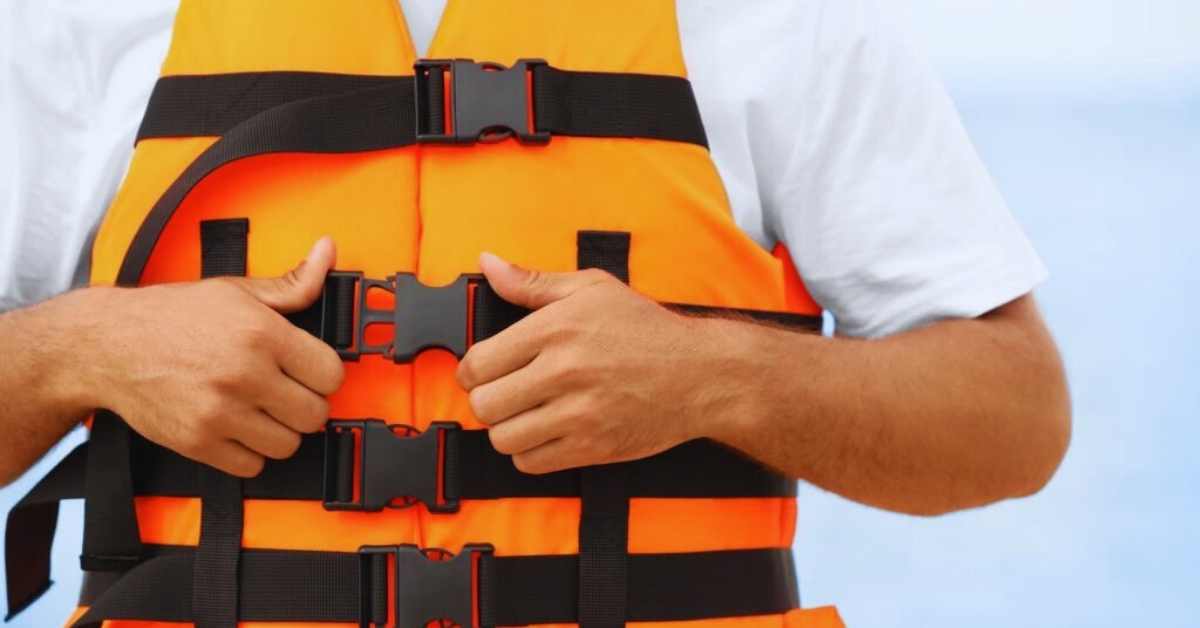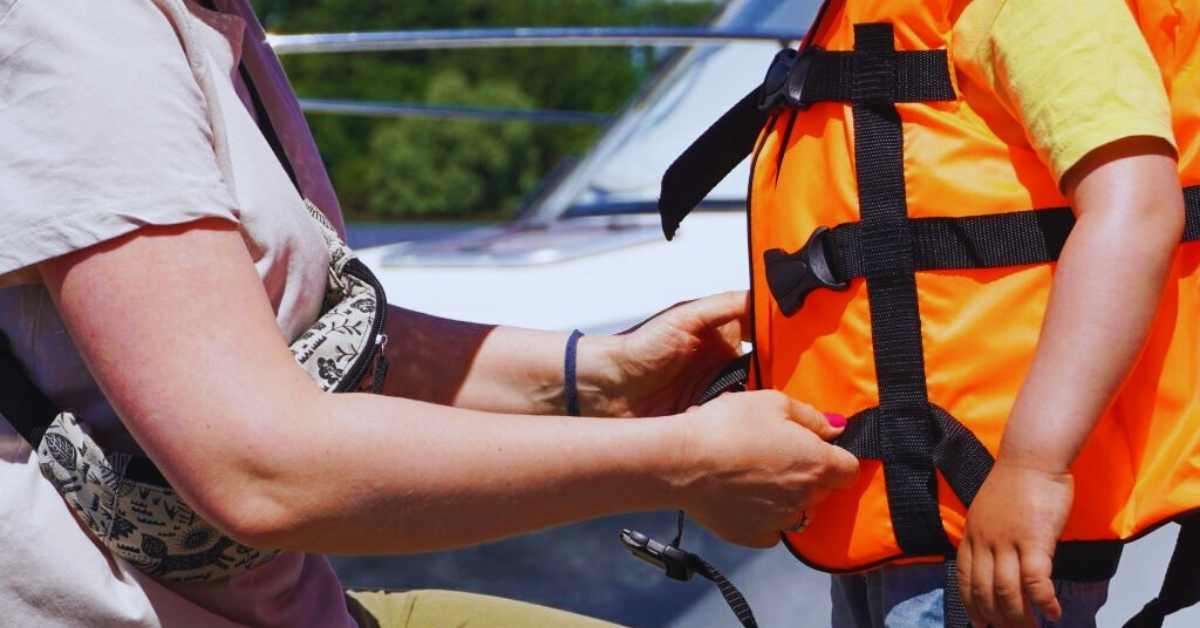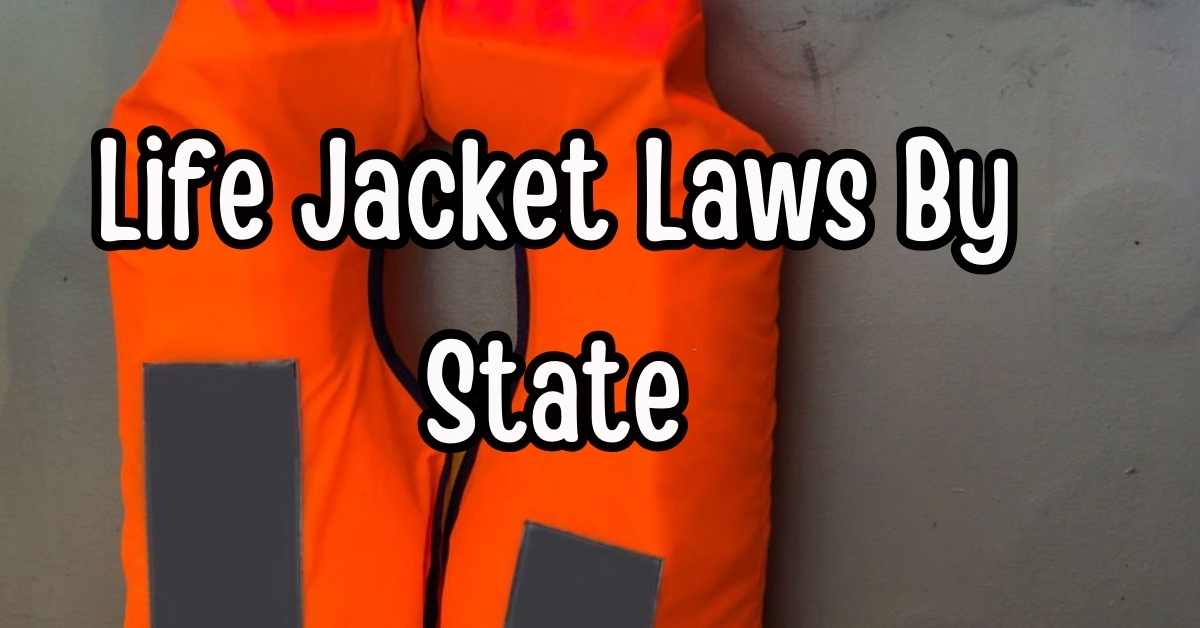If a sudden emergency happens, like being in a capsized boat or getting hit by something in the air, it’s very important to make sure you don’t drown.
The U.S. When you’re traveling on boats, the Coast Guard wants you to buckle up and wear a life jacket.
Doing these two things can greatly lower the risk of serious harm if you get trapped in the water accidentally. In this article we will discuss about Life Jacket Laws By State.
Table of Contents
What Is Life Jacket Laws
Life jacket laws are rules that govern the use of life jackets when you’re on the water. Life jacket laws are made to keep people safe while doing water activities like boating, swimming, or fishing.
The rules about wearing a life jacket differ depending on the area you’re in. Some states say you have to wear one anytime you’re near water, while others have age or activity rules.

Make sure you know the life jacket laws in your area. This will keep you safe, prevent legal trouble, and protect others too.
It’s always a good idea to wear a life jacket, even if the law doesn’t specifically require it. Accidents can happen when we least expect them.
Life jackets aren’t only for weak swimmers or kids, but they can save anyone in a water emergency. To stay safe and have peace of mind while on the water, follow life jacket laws and always wear one.
Life Jacket Laws By State
Boating laws differ from state to state in the United States, leading to a lack of consistency.
If you’re a boat owner who wants to follow safety regulations, using a life jacket is the solution. It can be especially helpful to have one on board to comply with the laws of your state. This is both convenient and important for your safety.
The requirements for obtaining a life jacket vary significantly from state to state. Just check with your local authorities before going on any water outing!
1. Alabama Life Jacket Laws
In Alabama, there are specific life jacket laws that one must abide by when engaging in water activities.
When it comes to kayaking, it is mandatory for individuals to wear a life jacket at all times. This ensures their safety and reduces the risk of drowning accidents.
Additionally, there is a minimum age requirement for wearing a life jacket, which varies depending on the state’s regulations. It is crucial to check the specific age restrictions before allowing children to participate in water activities.

Furthermore, approved life jackets must be worn to meet safety standards set by the state. These jackets are designed to provide maximum protection and buoyancy in case of emergencies.
Lastly, Alabama has vessel length requirements that determine when a personal flotation device (PFD) should be worn by a child aboard a boat or any other watercraft.
Adhering to these laws guarantees everyone’s safety while enjoying water-based adventures in Alabama!
2. Alaska Life Jacket Laws
As of the moment, Alaska is one of the only two states wherein it is unlawful to enter within a boating vessel without wearing a life jacket.
Unfortunate fatalities are shockingly common in this region; therefore it’s essential that every trip on water is safe and comfortable as well!
To cite an example, if you were to be apprehended within 200 feet of an anchored vessel during low tide or mid-elevation, it would be obligatory for all persons onboard to wear life jackets.
If they do not conform with any requirements outlined by law such as size: adults must wear either Type I or Type II standards while infants require a Type III device then they risk incurring a $250 fine and possible ramifications!
3. Arizona Life Jacket Laws
If you are planning a trip to Arizona and love water activities, it’s crucial to familiarize yourself with Arizona’s life jacket laws.
These laws are in place to ensure the safety of everyone, especially those who are engaged in water sports or boating. In Arizona, children who are under the age of 12 are required to wear a life jacket while on a moving watercraft.
This includes motorboats, sailboats, and personal watercraft. Additionally, all passengers on personal watercraft, regardless of age, must wear a life jacket. It’s important to note that life jackets must be U.S. Coast Guard approved and in good condition.
It is the responsibility of the boat operator to ensure that these laws are followed, and failure to do so can result in penalties.
So, before you embark on your water adventure in Arizona, make sure you have the appropriate life jackets and that you are aware of the laws to ensure a safe and enjoyable experience.
4. California Life Jacket Laws
California Life Jacket Laws are an essential component of boating safety in the state. It is crucial for all boaters to be aware of and comply with these laws to ensure the safety of themselves and others on the water.
Under California law, all children under 13 years old are required to wear a properly fitted life jacket while on a moving vessel that is less than 26 feet in length.
Additionally, all vessels, regardless of their size, must carry and maintain a sufficient number of life jackets for all passengers on board.
The life jackets must be Coast Guard-approved and in good condition. Boaters should also be aware that life jackets are required to be worn at all times while waterskiing or wakeboarding.
Failure to comply with these life jacket laws can result in fines and penalties, so it is essential to stay informed and adhere to the regulations to promote a safe boating environment.
5. Colorado Life Jacket Laws
Colorado has specific life jacket laws in place to ensure the safety of boaters and water enthusiasts.
These laws require that all children under the age of 13 wear a properly fitting and Coast Guard-approved life jacket while on a vessel that is underway. Additionally, Colorado law mandates that all personal watercraft operators, regardless of age, wear a life jacket at all times.
It is important to note that these laws are in effect regardless of the type of watercraft being used, including paddleboards, kayaks, and canoes. The penalties for violating these life jacket laws can be severe, ranging from fines to potential jail time.
Therefore, it is crucial for all individuals enjoying Colorado’s beautiful waterways to familiarize themselves with the state’s life jacket regulations and ensure compliance for their own safety and the safety of others.
6. Connecticut Life Jacket Laws
Connecticut’s rules for life jackets vary considerably from state to state, so it is prudent for those planning a trip here to familiarize themselves with its regulations:
If you can’t swim well or at all, or if you’re sailing or boating and your life jacket was damaged in any way during transport, do not discard it – instead procure another.
Must be worn on top of clothes when swimming if the temperature exceeds 70ºF (21ºC).
7. Georgia Life Jacket Laws
Georgia is one of the most lenient states when it comes to having an unmechanized life jacket onboard.
Georgia life jacket laws are crucial for ensuring the safety of individuals participating in water activities. It is important to understand and adhere to these laws to prevent accidents and save lives.
According to Georgia law, all children under the age of 13 are required to wear a properly fitted and Coast Guard-approved life jacket while on a moving vessel that is under 26 feet in length.

Additionally, all individuals on personal watercraft, such as jet skis, are required to wear a life jacket at all times.
These laws aim to protect individuals, especially children, from drowning incidents, which can occur unexpectedly and rapidly.
Failure to comply with these laws can result in penalties and fines. Therefore, it is essential to familiarize yourself with the Georgia life jacket laws and ensure that you and your loved ones are always wearing the appropriate life jackets when participating in water activities in the state.
8. Idaho Life Jacket Laws
Idaho is committed to providing life-saving equipment for boaters, making it the only state that doesn’t require any sort of safety gear.
Although not required by law, many Idaho boating enthusiasts still utilize them as a precautionary measure; however, most people do so without any legal repercussions if caught!
Idaho is a paradise for recreational boating, but if you find yourself in an accident on the open waters it’s crucial that you know what to do.
To ensure your wellbeing during such occurrences, it is highly suggested that anyone who has been injured contact emergency services immediately; one should also make sure that their boat is safely secured before departing its dockage area!
9. Illinois Life Jacket Laws
Illinois Life Jacket Laws mandate that every boater must carry a life jacket for each person on board the vessel.
This is a significant safety precaution to safeguard individuals during emergencies. It is worth noting that these laws are applicable to all types of boats, including canoes, kayaks, and paddleboards.
Moreover, children under 12 years old are obligated to wear a life jacket at all times while on a moving boat, unless they are below deck or in an enclosed cabin.
Additionally, it is crucial to possess properly fitting life jackets that are approved by the U.S. Coast Guard. These jackets should be in excellent condition, devoid of any tears or damage, and easily accessible in case of an emergency.
Failure to adhere to these laws can lead to fines and penalties. Therefore, it is crucial for boaters in Illinois to acquaint themselves with the life jacket laws and ensure compliance to prioritize safety on the water.
10. Indiana Life Jacket Laws
If you’re fishing off of the coast or in any body of water that is within a mile of the sea, then it is imperative to possess a life jacket.
Indiana’s law on this matter stipulates that those owning boats should ensure they have access to one. Without fail, they must also be available if requested!
If an emergency arises while out on the watery expanses and you require additional protection, making use of an inflatable life jacket may offer some reassurance.
11. Kentucky Life Jacket Laws
Kentucky is another state that allows lifejacket usage, but if you fail to use it in an emergency, the penalty may be severe.
If you don’t have a life jacket or other equipment on board your ship during boarding or detection, you’ll be fined $10–200.
Boaters must have necessary gear and supplies while going by water. Even though Kentucky has restrictions on such topics, state law does not require packing materials. Traveling is up to individuals’ discretion!
Only states that exempt products bought for usage on particular boats exclude life jackets from sales taxes.
You can buy a life jacket for free, but they always need an owner’s certificate. Entrusting someone with life-saving measures and leaving them unprotected is unacceptable. This is difficult, but boaters must be dressed properly by law.
Proper boating attire is crucial; you might be judged negligent if discovered without protection. Your state may also require you to secure flotation equipment before leaving.
Conclusion
The United States does not require life jackets for every boating activity, such as fishing or swimming.
Therefore, it is crucial to familiarize oneself with the laws of one’s state in order to ensure compliance with current regulations.
